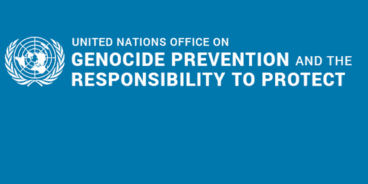
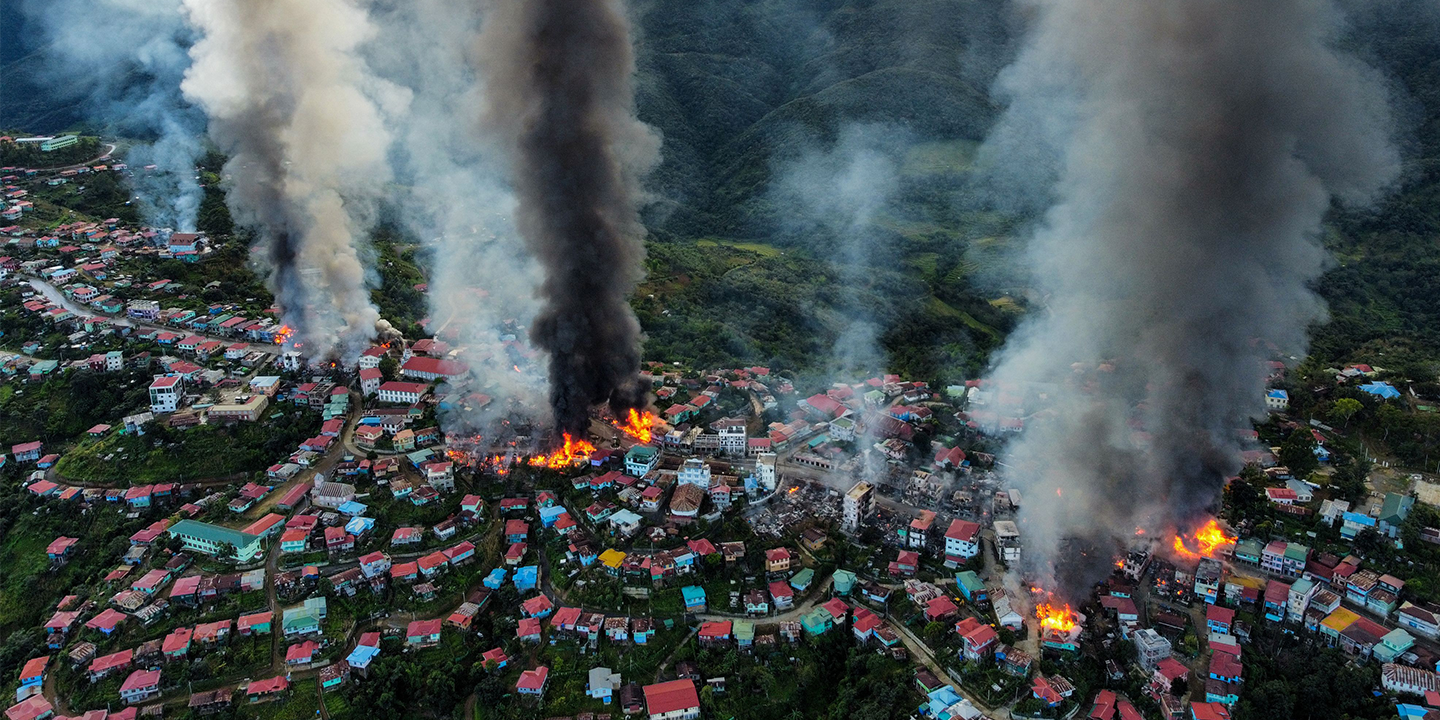
Global Centre Country Advocacy: Myanmar (Burma)
Since its inception in 2008, the Global Centre has been an unwavering advocate for addressing the long-standing atrocity risks and human rights abuses in Myanmar (Burma). Our work has evolved in response to the various crises over the past 15 years, but it has consistently focused on highlighting the root causes of atrocity crimes and pushing for justice for populations who have faced, or continue to face, war crimes, crimes against humanity and/or genocide.
Sustained Engagement with Affected Communities
For over a decade the Global Centre has worked closely with affected communities to maintain international attention on Myanmar, consistently facilitating opportunities for advocates and civil society leaders to engage with member states across various diplomatic and educational forums, such as R2P Focal Points, trainings and the annual Evans-Sahnoun lecture on R2P.
In March 2024 the Global Centre hosted the event “Preventing Atrocities with a WPS Perspective: A Myanmar Case Study”, which explored how the Women, Peace and Security agenda can inform effective atrocity prevention in Myanmar. The event featured civil society advocates and focused on the critical role of women in both documenting abuses and shaping justice and accountability processes. This initiative reflects the Global Centre’s long-term commitment to centering survivor voices, particularly women, and integrating their experiences into policymaking and prevention strategies.
This sustained collaboration ensures that the voices of those directly impacted remain central to policy discussions and international responses to the crisis in Myanmar.
Mobilizing international action on atrocities against the Rohingya
In August 2017 the military launched so-called “clearance operations” in Rakhine State, purportedly aimed at confronting the Arakan Rohingya Salvation Army. These operations led to widespread atrocities and forcibly displaced over 900,000 Rohingya to Bangladesh. In response to these atrocities, the Global Centre:
-
-
- Organized an informal briefing for UN Security Council (UNSC) members and a high-level UN event in partnership with the Permanent Mission of Bangladesh on how the international community could move from condemnation to concrete action on the Rohingya crisis.
- Led targeted bilateral advocacy that resulted in the UNSC adopting a Presidential Statement on the situation which emphasized “the primary responsibility of the Government of Myanmar to protect its population including through respect for the rule of law and the respect, promotion and protection of human rights.”
- Engaged directly with Rohingya refugees in Bangladesh, ensuring their voices were heard in international advocacy efforts.
-
In August 2018 the Human Rights Council (HRC)-mandated Independent International Fact-Finding Mission (FFM) on Myanmar reported that the treatment of the Rohingya by Myanmar’s security forces amounts to four of the five prohibited acts defined in the Genocide Convention. Given the significance of these findings, the Global Centre led advocacy efforts, including:
-
-
- Pushing several UNSC members to invite the FFM Chair, Marzuki Darusman, to brief the Council in September 2018, marking the first time that an HRC-mandated investigative mechanism briefed the UNSC directly on an ongoing country-specific situation.
-
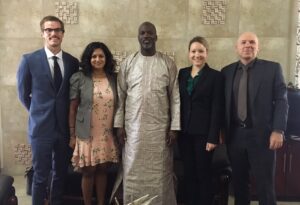
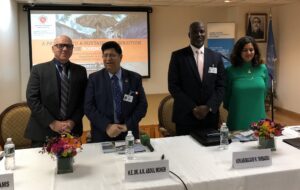
Advocating for accountability for the Rohingya Genocide at the International Court of Justice (ICJ)
The Global Centre has conducted sustained advocacy urging states, regional bodies and multilateral institutions to pursue justice for mass atrocities in Myanmar. In 2018 the Global Centre, in partnership with the Global Justice Center (GJC), developed a campaign to advance state accountability for the Rohingya genocide by urging states to file a case against Myanmar at the ICJ for violations of the Genocide Convention. In early 2019 The Gambia, supported by the Organisation of Islamic Cooperation, expressed willingness to pursue the case. Following an invitation from The Gambia’s Minister of Justice, Global Centre staff traveled there to discuss collaboration. In September 2019 The Gambia’s Minister of Justice, Hon. Abubacarr M. Tambadou, publicly announced at a Global Centre event during the 74th UN General Assembly that The Gambia would formally file a case against Myanmar at the ICJ. The Global Centre, together with GJC, produced multiple Q&A documents explaining the ICJ process, outlining the roles of parties to the Genocide Convention and the UNSC and explaining the significance of the case.
Following the ICJ’s hearing of preliminary objections raised by Myanmar in February 2022, the Global Centre, alongside members of the Asia Justice Coalition (AJC), issued a joint statement highlighting the significant risk of atrocities facing the Rohingya. The Global Centre has also initiated discussions on the effectiveness of the international criminal justice system to deter atrocity crimes and hold perpetrators to account. In June 2022, together with the Cyrus R. Vance Center for International Justice, the Global Centre hosted an event, “Quo Vadis? The Prosecution of Atrocity Crimes from Myanmar to Ukraine.” Speakers included Mr. M. Arsalan Suleman, Counsel at Foley Hoag LLP and Counsel for The Gambia in its case against Myanmar at the ICJ.
Despite the lack of political will, the Global Centre continues to advocate for the UNSC to refer the entire situation in Myanmar to the International Criminal Court.
Post-coup advocacy efforts
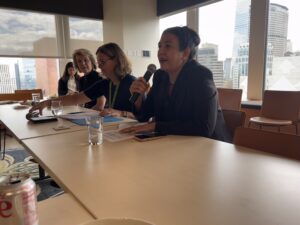
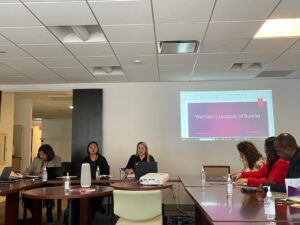
Since the February 2021 military coup, the Global Centre has engaged in targeted advocacy to address escalating threats to populations across the country amid ongoing war crimes and crimes against humanity. The Global Centre has coordinated advocacy and joint statements with hundreds of civil society organizations to amplify policy asks and provided evidence of atrocities to the UN human rights system, governments and parliamentary hearings.
The Global Centre has also played a crucial role in convening discussions among affected communities, civil society organizations and policymakers to strategize and explore new paths forward for addressing Myanmar’s atrocities.
The Global Centre has consistently conducted targeted advocacy, urging governments to suspend their assistance to Myanmar’s military and to impose sanctions on key military officials responsible for atrocities. The Global Centre continues to advocate for a UNSC resolution that would impose targeted sanctions and an arms embargo on Myanmar.
Related Content

Savita Pawnday interviewed on gender, genocide and atrocity prevention
